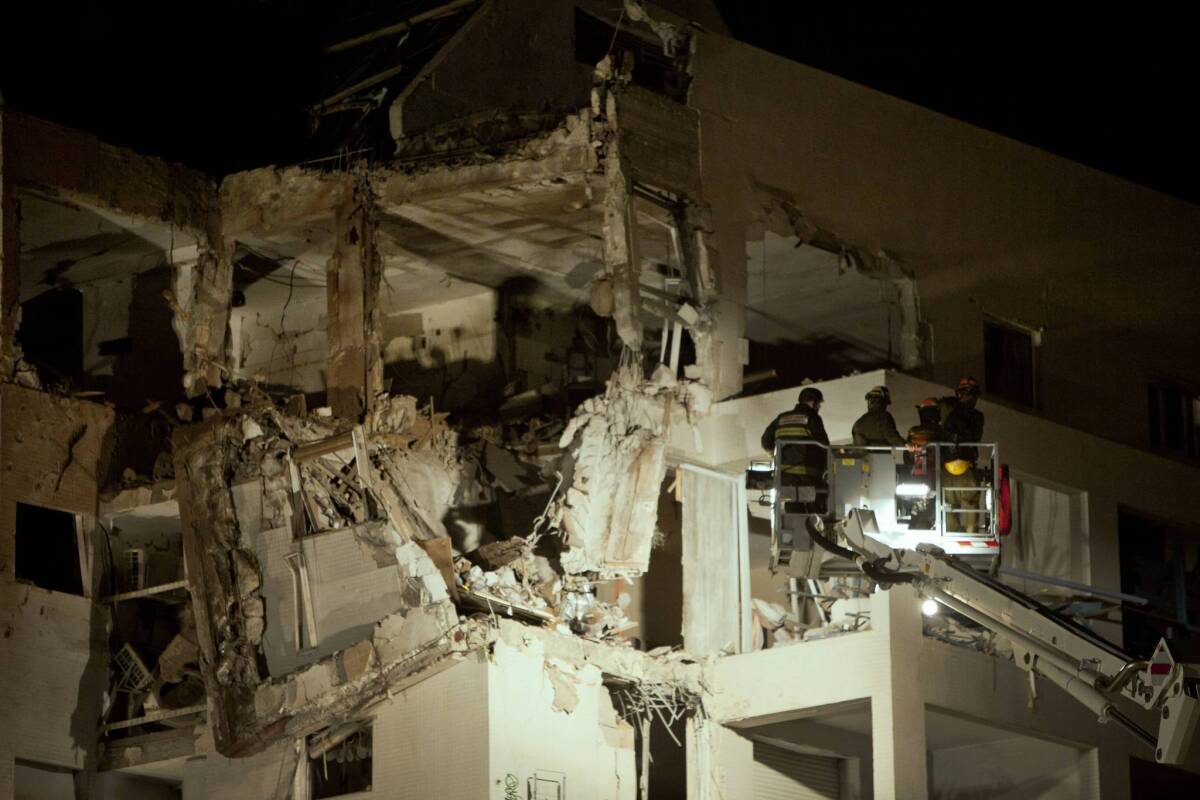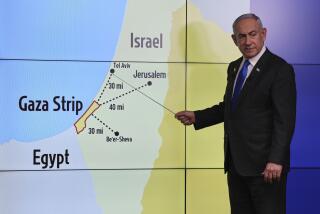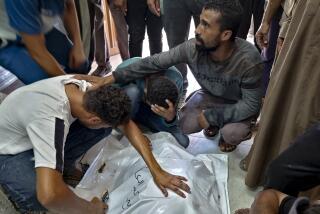Hillary Clinton joins efforts to halt Israel-Hamas fighting

GAZA CITY — Secretary of State Hillary Rodham Clinton pressed for an end to rocket attacks on Israel and a durable regional peace as she arrived in the Middle East to join efforts to end a week of fighting between Israel and the Islamist militant group Hamas.
An agreement appeared close late Tuesday but proved elusive, and in the meantime violence continued. Hamas fired two more rockets toward Jerusalem but caused no damage or injuries. But rocket and mortar fire from the Gaza Strip killed an Israeli soldier and a Bedouin resident in southern Israel, increasing the Israeli death toll to five.
Israel responded with airstrikes on what it said were rocket-launching squads, underground weapons caches, a Hamas-owned bank, smuggling tunnels and other targets. By late Tuesday, Hamas’ Health Ministry said, the Palestinian death toll in the conflict had increased to 133, including many militants but also 33 children. It said more than 1,000 people had been wounded.
Clinton, who was visiting Asia with President Obama, traveled to Jerusalem and met late Tuesday with Israeli Prime Minister Benjamin Netanyahu. Obama and Clinton had been making frequent calls to Middle East leaders to press for an end to the fighting, but aides said the calls left Obama convinced that the U.S. needed to be more deeply involved.
“The rocket attacks from terrorist organizations inside Gaza on Israeli cities and towns must end and a broader calm restored,” Clinton said. “The goal must be a durable outcome that promotes regional stability and advances the security and legitimate aspirations of Israelis and Palestinians alike.”
Netanyahu said he preferred a “long-term solution” through diplomacy, but that Israel “will have to take whatever actions necessary to defend its people.”
Neither side appears to want to see an Israeli ground incursion. After seven days of fighting, many Gaza residents said they were ready for life to return to normal.
But in addition to its airstrikes, Israel sent hundreds of panicked residents in northern and eastern Gaza City fleeing their homes over fears of an impending ground assault. Israeli aircraft dropped leaflets warning residents to evacuate immediately and specifying which streets to use to avoid harm, a move that led many to fear an assault was imminent. Previously Israel’s leaflets had included only general warnings for residents to stay away from Hamas buildings or officials.
Hamas officials had been hoping to finalize an agreement by Tuesday night, predicting a cease-fire would take effect by midnight. But as the evening wore on, Israeli and Egyptian officials began downplaying expectations, warning that no deal had been signed. All sides hinted that a deal might be reached Wednesday.
According to one senior Hamas official, the parties reached a “major breakthrough” Tuesday when Israel agreed to halt attacks against Gaza, stop targeted killings of Hamas leaders and ease border restrictions.
Israel has not commented on details of any possible agreement. It is seeking an end to the rocket fire by Gaza militants and assurances — backed up by Egypt and the international community — that Hamas won’t be allowed to rebuild the weapons caches that Israel has destroyed.
The talks are being conducted through Turkish and Egyptian intermediaries in Cairo because Israel and Hamas don’t formally recognize each other.
Ben Rhodes, the deputy national security advisor, told reporters traveling with the president that Obama had not asked Netanyahu to hold off on sending ground troops into Gaza. State Department and White House officials carefully avoided using the term “cease-fire,” suggesting that they may be satisfied with something less than a formal halt to hostilities, at least for now.
If a cease-fire, or something close to it, is announced, analysts in Washington said, Clinton could use American influence to pressure the parties to adhere to it.
“She’s there as a guarantor,” said Robert Danin, a former senior State Department official in the Middle East who is now an analyst with the nonpartisan Council on Foreign Relations. After Jerusalem, Clinton was scheduled to visit Palestinian officials in Ramallah and then travel to Cairo.
For Israel, a deal may be its best bet at ending the barrage of rockets from Gaza militants. One million Israelis spent much of the last week scrambling for the safety of bomb shelters under a shower of more than 1,000 rockets.
Leaders of key regional powers such as Egypt and Turkey have sharply criticized Israel, and that appears to have emboldened Hamas.
Depending on the details of an agreement, Hamas, which Washington and many Western countries regard as a terrorist organization, might emerge with more international credibility and might be able to claim the truce as a victory for its pursuit of Palestinian independence through armed struggle rather than diplomacy. But that would also obligate Hamas to act as a serious negotiating partner.
“There’s nothing wrong with transitioning from a situation that is exclusively about fighting to a phase of dialogue and understanding of the game of dialogue and … the rules of the game,” said Gilead Sher, who was an Israeli negotiator for the Olso peace accords. “Talking is far less harmful than shooting.”
Hamas spokesman Fawzi Barhoum said the movement had become stronger through the current conflict. “The world must change its mind about Hamas,” he said. “Hamas is a pragmatic movement.”
After a relatively quiet morning Tuesday as negotiators tried to finish an agreement to end the fighting, tensions rose.
The two rockets fired at Jerusalem landed harmlessly south of the city in the West Bank region of Gush Etzion.
In addition to the two Israelis who were killed, a total of 200 rocket strikes Tuesday wounded five Israelis and caused damage in cities including Ashkelon and Rishon Lezion, where an apartment building was on the verge of collapse.
Masked men in Gaza City publicly shot and killed six people suspected of collaborating with Israel and dragged their bodies through the streets, Hamas radio reported.
By Tuesday evening, the buzzing of drones over Gaza marked the resumption of heavy Israeli airstrikes. The military said it targeted 13 underground rocket-launching sites and a senior operative of the Islamic Jihad group, Yunas Shluf.
Two journalists for Hamas-affiliated Al Aqsa television were killed as they drove in their car, Palestinian officials said.
Smuggling tunnels to Egypt have been virtually cut off because of Israeli bombing, so food shortages were beginning to appear, particularly on items such as milk, cheese and canned goods, vendors said. Cigarette prices have gone up 25% since last week.
Crowds were noticeably smaller than usual at the Fras outdoor farmers market. Wagons of pears, apples, garlic and cucumber lacked buyers.
“Customers are too afraid to come,” said Ibrahim Rajab, 41, standing over a cart brimming with plump red tomatoes.
Prices so far have been steady, though he said some markets are exploiting the situation by charging more.
By 1 p.m., Fras was closing down and Rajab was desperate to sell off his supply. “From this point I’ll take anything,” he said, shrugging. “It’s better than throwing it away.”
Schools, government offices and most companies remained closed, though many grocery stores stayed open. But most people preferred to stick close to home.
“We want to live normally,” said Iman Zakaria, 45, a Gaza City homemaker. “I want to be able to sit on my balcony and see the sky, not rockets.”
Times staff writers Kathleen Hennessey in Phnom Penh, Cambodia, and Jeffrey Fleishman in Cairo contributed to this report.
More to Read
Sign up for Essential California
The most important California stories and recommendations in your inbox every morning.
You may occasionally receive promotional content from the Los Angeles Times.










